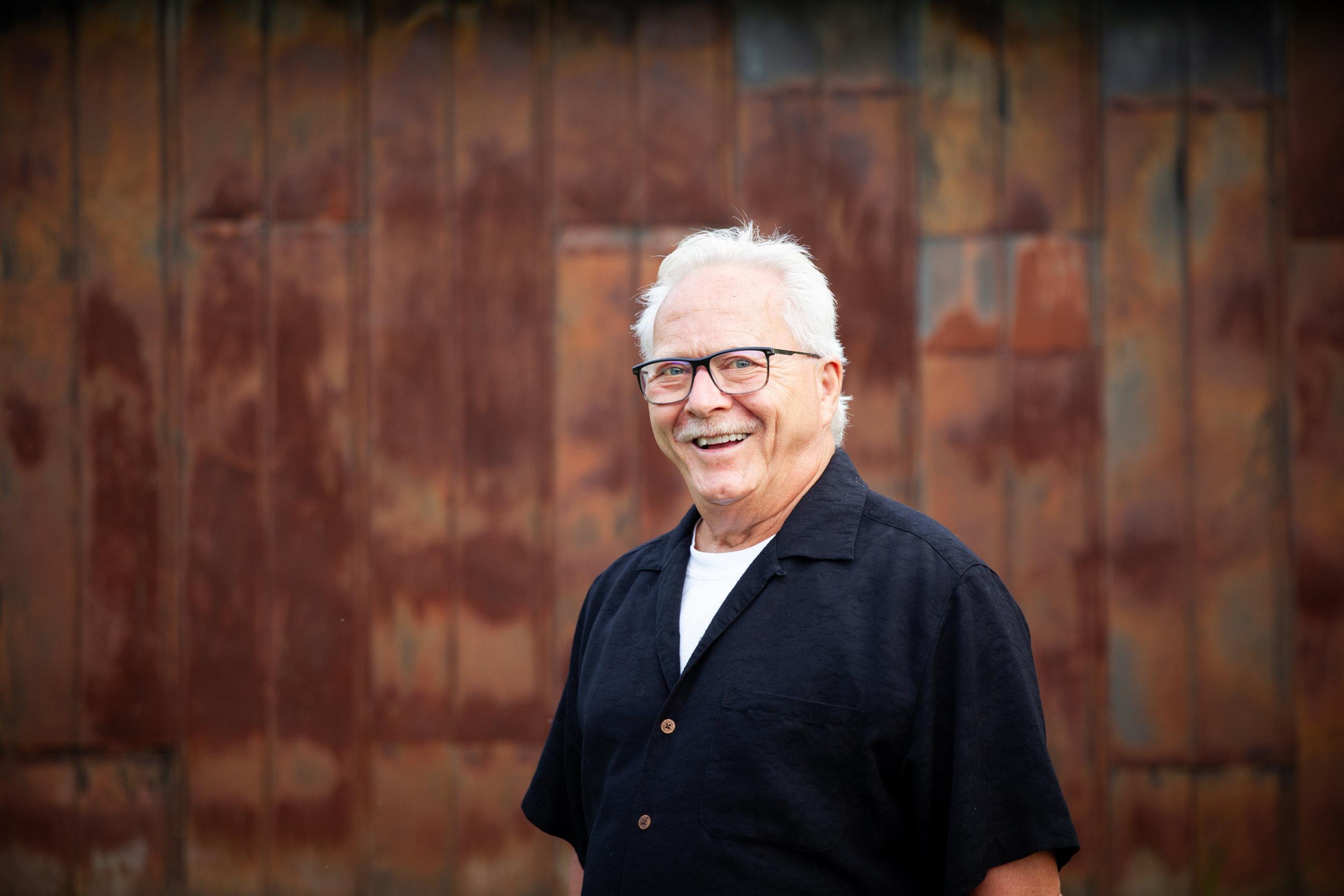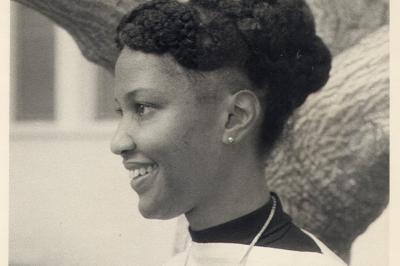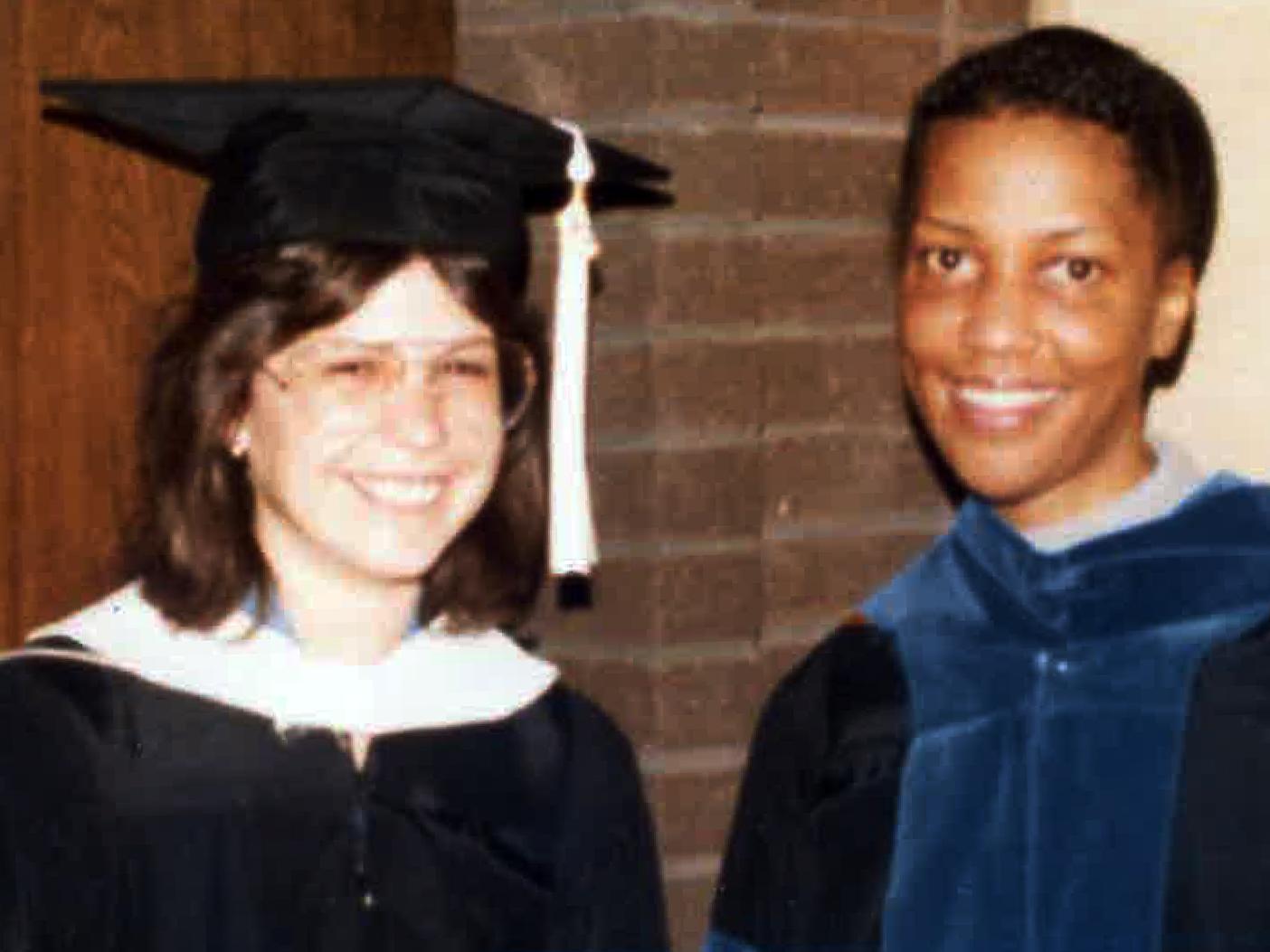
Jim Loomis ’80 traveled a rough road on the way to Viterbo, but his time here put him on the road to success. His gratitude for that—and a friendship he formed here as a student with Thea Bowman, FSPA '65—were so strong he recently made a large gift to fund an endowed fellowship to honor his friend and promote social justice.
Growing up in the Eau Claire area, his parents split up. When he and his twin sister were 14, their mother died. With their father out of the picture and no relatives to take them in, they were placed in separate foster homes.
None of their three older brothers went to college—all joined the military—but Loomis was determined to get an education. In high school he got his own apartment rather than stay in foster care, and after graduating from Eau Claire Memorial, he enrolled at the University of Wisconsin-Eau Claire as a pre-med major, aiming to become a doctor.
He struggled with chemistry, though, and set his sights on becoming a nurse.
“I was so proud of him for going to college and never giving up,” said his twin sister, Jane Dobbs. “He went to Viterbo because it was the best-known college for nursing. He made up his mind that that’s where he was going and that’s where he went.”
At Viterbo, Loomis got the help and encouragement he needed to get through chemistry. More than that, he met someone in the first few weeks of his first semester at Viterbo who would be a big force in his life, a friend who would provide lifelong inspiration. Their almost cinematic meeting on a September morning was etched in his memory.
“Entering Murphy Center, the sun shining up the steps behind me as I reached the second floor, I saw a young lady standing at the weekly events board,” Loomis recalled in a story he wrote. “She was different. It was as if the sunbeams had somehow turned the corner as she was radiant looking. I knew instantly she was different as a glow, an aura of unusual design, seemed to surround her.”
Loomis approached her and introduced himself. “I haven’t seen you in any of my classes,” he said.
The young lady offered a radiant smile and chuckled. “Hello,” she said, “I am Sr. Thea, chairman of the English department, and I have not seen you in any of my classes either.”
Thea Bowman, FSPA ’65, had a way of making an impression on most people she met, but Loomis felt a stronger connection, as if he’d found a new sister in this place so far from his twin.
“She found beauty in everyone,” Loomis recalled “Her spirit would shake an entire room, bring people together, celebrate our differences, nurture talents, boost confidence, motivate, and encourage people to follow their dreams.”
Her class on Southern literature brought the works of William Faulkner, Eudora Welty, and others to life in a way that stuck with Loomis. Part of that came from Sr. Thea’s insights from growing up in the South. The climax of the class was a trip to Mississippi, where the Viterbo students stayed with Black families in their homes and got a chance to visit with Welty at her home.
Loomis and Sr. Thea’s paths at Viterbo only ran together for two years, but they had formed a friendship that endured. Loomis worked hard to make sure Sr. Thea was the guest speaker at his commencement ceremony in 1980, and she was a guest at the graduation party he threw, where Loomis’s sister got to meet her.
“He was so thrilled with Sr. Thea. She was like his soulmate. He talked about her all the time. Jim would have given his life for Sr. Thea. He thought the world of her,” Dobbs said. “He got along so well with all the Sisters. He loved them so much.”
After graduation, Loomis moved to Chicago, working as an emergency room nurse. In the 1980s, when Sr. Thea traveled the country speaking, she would always connect with Loomis when she was in Chicago; he often was the one to pick her up at the airport. Loomis also visited Sr. Thea when she was home in Mississippi.
Jim Barrett, Loomis’s partner since 1981, said Loomis’s love for Sr. Thea, the Sisters, and Viterbo was remarkable, and that love and gratitude never flagged over the years.
“I was always fascinated by the way he talked about Viterbo and the Sisters. You’d have thought he was Catholic,” Barrett said of Loomis, whose faith was based in the Lutheran traditions. “He was clearly influenced by Sr. Thea because of her personality, her character, and her teachings. I think he learned a lot from her and treated people accordingly.”
In addition to the nursing skills he learned at Viterbo, Loomis also had an innate sense of empathy that made him a great nurse, Barrett said. “He really understood the amount of pain people were in and how to deal with it. He certainly knew how to take care of people.”
Between Sr. Thea’s 1984 breast cancer diagnosis and her death in 1990, Loomis saw how she suffered as her cancer spread. Her pain was immense, but she never worried when he was the one pushing her wheelchair. “She knew I would move her like a fine, fragile piece of porcelain to avoid further discomfort,” he recalled.
Although her death was devastating to him, Loomis found some comfort in how at peace Sr. Thea was as she approached the end. And like her, Loomis was at ease contemplating his own mortality. God saves the best for last, after all.
His first heart attack in 2005 forced him to give up his high-stress ER work and he became a cardiac rehabilitation nurse instead. After years of that cardiac rehab work, he well knew what his heart damage meant and he began his estate planning.
In 2013, Loomis let Viterbo’s advancement office know he was making a bequest of $100,000 to the Viterbo Fund. After Viterbo launched the Sr. Thea Bowman Center in 2021, however, Loomis changed his mind. He wanted to make a gift while he was still alive, and he wanted it used to create a fellowship in honor of Sr. Thea.
The Sister Thea Bowman Fellowship Endowment that Loomis created will provide grants for Viterbo “faculty or students to conduct research and/or provide service in social justice and equity.” To fund the fellowship endowment, Loomis opted to make a charitable distribution from his retirement account, something he could do after he reach the age of 70½ on Aug. 5.
In July, Loomis was contacted to see if he would be willing to be featured in Viterbo’s magazine, Strides, to recognize his generosity. He consented to the magazine “Legacy” feature, but he wanted to write a story about his connection with Sr. Thea before doing an interview.
He’s lived in Michigan since he retired, so a nearby photographer was hired to take photos of him for the magazine. He and the photographer got to talking and at the end of their two-hour session he gave her his address and told her to come over so he could give her plants for landscaping her recently built house.
That kind of generosity was typical of Loomis, his sister said. He would send Michigan fruit and gift cards to the La Crosse food co-op and the Waterfront Restaurant to the Sisters at the St. Rose Convent, Dobbs said. “He always did good deeds for the Sisters. He always kept them in his heart. He wanted to reward those who got him as far as he got.”
When he was a cardiac rehab nurse, he put on Christmas parties for patients, sending around a limousine to pick them up (one year he needed two limos). And when he learned that a co-worker hadn’t been able to go home and see her family for many years, Loomis surprised her with round-trip airplane tickets to the Dominican Republic.
“He was such a giving person,” Dobbs said. “He was always giving something.”
On Tuesday, Aug. 1, hours after his photo session, Loomis had another heart attack, serious enough that they transferred him by helicopter from the hospital in Kalamazoo to one in Grand Rapids. On Friday, Loomis called the Strides writer at Viterbo he was working with to let him know he was in the hospital. He didn’t pull any punches about his chances of survival, and he noted he had contacted his attorney to make sure everything was in order with the money transfer for the fellowship endowment to take place on Sunday, Aug. 6.
Loomis said he would have Barrett bring his laptop to the hospital so Loomis could email his story about Sr. Thea, which he titled One September Day. Barrett delivered the laptop on Monday, and, true to his word, Loomis emailed the story. That evening, at about 10:45, Loomis’s heart beat for the last time.
“We all knew this day was coming, but you’re still not prepared for it,” said Dobbs, who said she talked with her twin brother every day, even when he was working as a nurse in Saudi Arabia in the early 1980s for 15 months. “I keep waiting for him to call.”
On one of their last calls, when he was in the hospital, Dobbs said her brother talked about how happy he was to be able to honor Sr. Thea and show his gratitude to Viterbo.
“He had so much respect and affection for Viterbo,” she said. “He’d say, ‘Jane, I’d never be where I am today if it wasn’t for them.’ He had a good life. I’m just glad he got to enjoy the life he had.”
Loomis closes his story about Sr. Thea with a reference to his fellowship endowment: “May this gift help spread her words to others and make this world a better place.”







